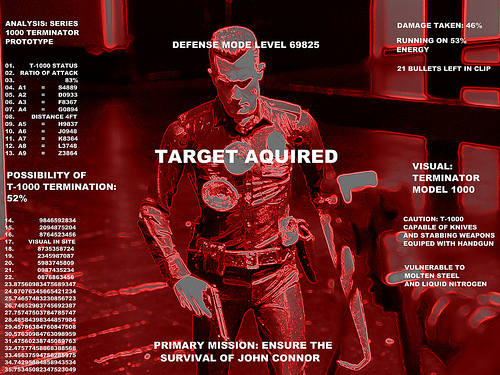While the Terminator is a machine and you would think a perfect killer, there are considerations to take into factor.
Shadowboxes -For those of us that are rather ardent shooters, we know shadowboxes to be vice-like contraptions that will hold a rifle perfectly still for zeroing (or obtaining sight accruacy to the shooter's eyeball for those of the layman quantity). Despite a rifle that is vice clamped to perfect stillness, you will not get one bullet to hit on top another; if it happens, it is merely conditions, not rules. Every weapon has a Minute of Angle, which is a fraction of a degree over distance that a bullet will ultimately veer. Everything from the best rifle to the crappiest Derringer has this. No matter what, there is a degree of variance.
Is it needed? - We humans are rather squishy and fragile. It could be that Skynet opted for something else than high-end calibration software/hardware and auto-targeting parimeters to aid in killing a species where a general double-tap in a region the size of the back of a chair will do. A computer might have opted to put more useful information in the T-101's and 800 series; like infiltration and adaptability software. Seriously, a Terminator only really needs guns for volume and effect; it could easily kill a solo opponent unless opponent is exceptionally well-armed and has the advantage of 'the drop' or the element of surprise. Even then, it might be chancey.
Is it possible? - 'Perfect Aim' is quite a feat, and would require some high-skilled machining for servos, dampeners, compensators, springs/shocks, and hand/eye computations. We can do it naturally; machines have proven to be a little more difficult because of the depth problem. For us, it is real, while for a machine it is still digital images. Range would just be a number, and though it might understand bulletdrop, a thing without feeling might not understand pull trigger faster, about to die! or crap, he has a bulldozer! To me, a machine that does not fear would need to 'elevate' itself to be better. Something that I think matches better with the Borg since they were once organic beings.


21 bullets left in clip- oh for accuracy in terminology!